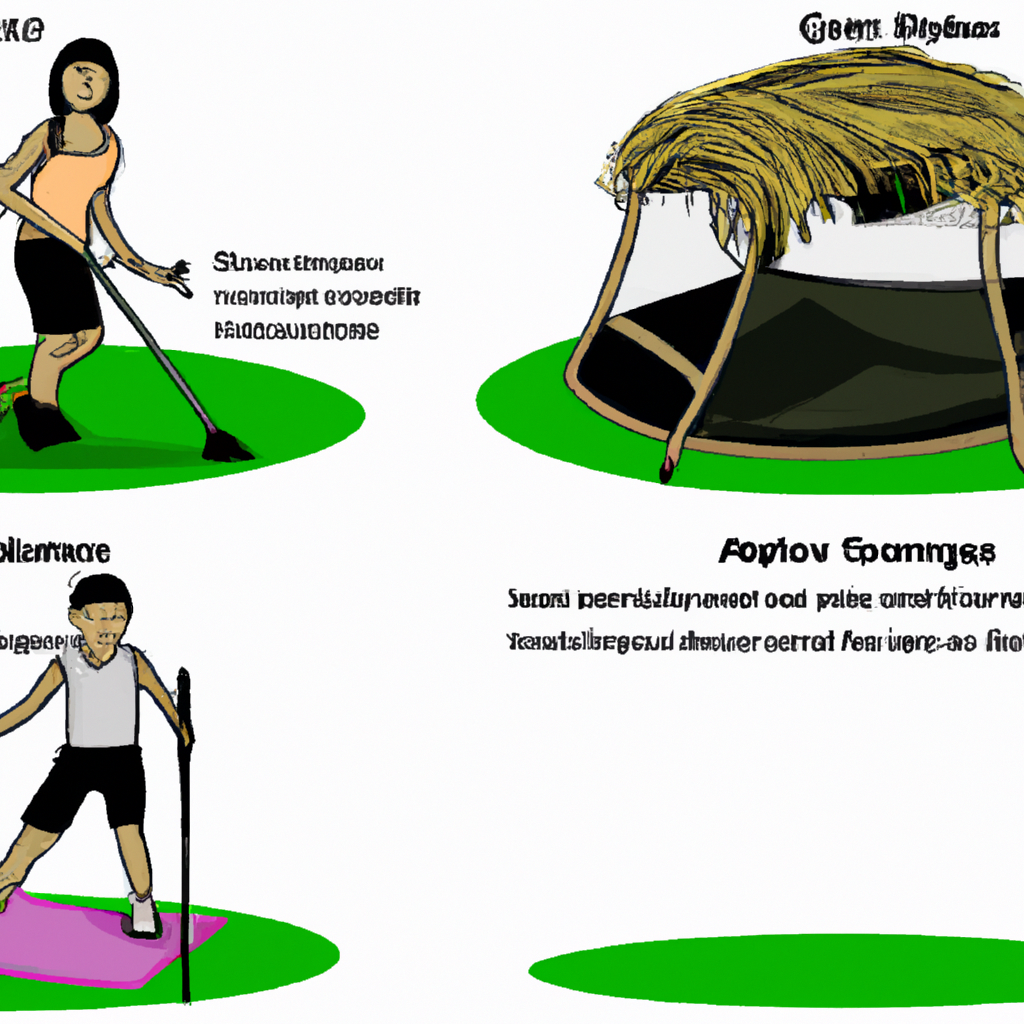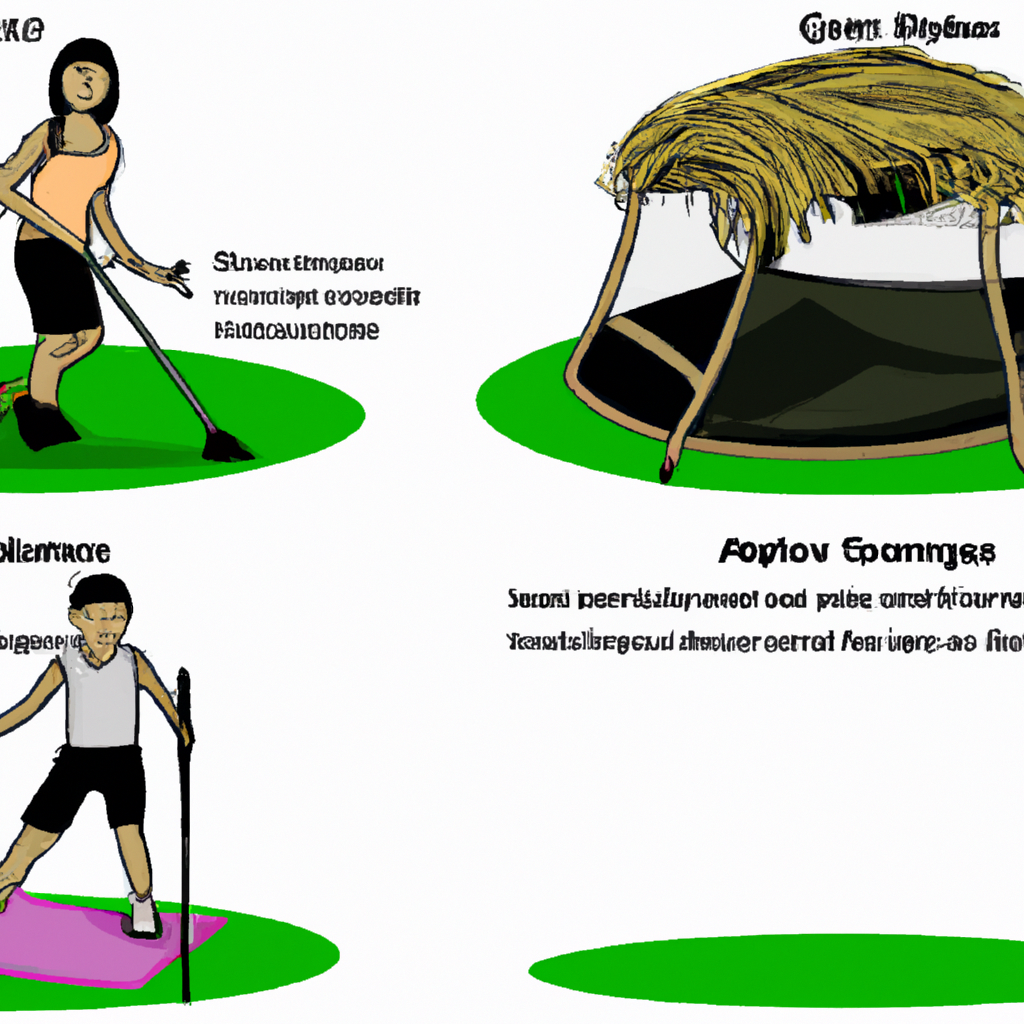Planning a camping trip with your young children can be an exciting and memorable experience. However, before you pack up the tent and gather the s’mores supplies, it’s important to be aware of any specific safety considerations that come along with camping with little ones in tow. From understanding potential hazards to taking precautions and being prepared, this article explores the essential safety measures you should take to ensure a fun and secure camping adventure for the whole family. So, before you set out on your outdoor escapade, let’s dive into the important considerations you need to keep in mind.

Choosing a Campsite
Location
When choosing a campsite for your outdoor adventure, it’s important to consider the location. Look for a site that is convenient and easily accessible, especially if you have young children. Being close to home or having nearby amenities can make your camping trip more enjoyable and less stressful for both you and your little ones. Additionally, consider the surroundings and choose a location that offers beautiful scenery, such as a forest, a lake, or a beach, as this can greatly enhance the camping experience.
Terrain
Another factor to consider when selecting a campsite is the terrain. Look for a site that is relatively flat and free of any potential hazards, such as steep cliffs or rocky terrain. This will make it easier to set up your campsite and create a safe and comfortable environment for your family. Additionally, consider the type of terrain that is best suited for the activities you have planned. For example, if you’re planning on hiking or biking, choose a campsite with trails nearby.
Facilities
The availability of facilities at your chosen campsite is another crucial factor to consider, especially when camping with young children. Look for a site that offers amenities such as clean bathrooms, showers, and potable water. These facilities can make your camping experience more convenient and comfortable, allowing you to focus on spending quality time with your family. Additionally, some campsites may offer playgrounds or recreational areas specifically designed for children, providing them with additional entertainment options during your stay.
Preparing the Campsite
Clearing Hazards
Before setting up your campsite, it’s important to clear any potential hazards that could pose a risk to you and your family. Remove any sharp objects, such as rocks or broken glass, from the area where you plan to set up your tents. Additionally, be mindful of low-hanging branches or overhead power lines that could pose a danger. Taking the time to thoroughly inspect the area and clear any hazards will help create a safer environment for everyone.
Setting Up Boundaries
Establishing boundaries around your campsite is another essential step in preparing for a safe camping experience. This can be done by using ropes or caution tape to designate the limits of your campsite. By clearly defining the boundaries, you can ensure that your children stay within a safe area and minimize the risk of accidents, such as wandering off into unfamiliar territory. Setting up boundaries also helps to create a sense of privacy and security for your family during your camping trip.
Securing Equipment
Securing your camping equipment is crucial to prevent accidents and keep your belongings safe. Make sure to properly secure all tents, canopies, and other structures to prevent them from collapsing or being blown away by strong winds. Additionally, secure any cooking equipment, coolers, or other items that could attract wildlife or pose a danger to children. Properly securing your equipment will give you peace of mind and allow you to fully enjoy your camping experience without worrying about potential mishaps.
Weather Conditions
Monitoring Weather Reports
Weather conditions can greatly impact your camping experience, especially if you have young children. Before heading out to your chosen campsite, make sure to monitor weather reports and forecasts. Keep an eye out for any severe weather warnings or advisories that could affect your safety. Understanding the weather conditions in advance will allow you to make informed decisions and take appropriate precautions to ensure the safety and comfort of your family.
Preparing for Extreme Weather
In the event of extreme weather, it’s important to be prepared. Pack appropriate clothing and gear to withstand different weather conditions, such as rain gear, warm layers, and sun protection. Consider bringing extra tarps or waterproof covers to protect your camping equipment and create shelter in case of heavy rainfall. Familiarize yourself with emergency procedures, such as where to seek shelter or evacuate to in case of severe weather. Being prepared for extreme weather will help keep your family safe and minimize any potential risks.

Campfire Safety
Supervision
Campfires can be a highlight of any camping trip, but they also pose potential safety risks, especially when children are involved. It’s essential to always supervise children around a campfire to ensure their safety. Never leave children alone near a fire, and establish clear rules regarding their behavior around the fire. By maintaining constant supervision, you can prevent accidents and ensure a safe and enjoyable campfire experience for everyone.
Establishing Fire Rules
Establishing fire rules is an important step in campfire safety. Teach children to keep a safe distance from the fire and never touch or throw anything into it. Explain the dangers of playing with fire and the consequences of not following the established fire rules. Make sure to have a fire extinguisher or a bucket of water nearby to quickly extinguish the fire if needed. By setting clear rules and educating your children about fire safety, you can minimize the risk of accidents and promote a safe camping environment.
Extinguishing the Fire
Properly extinguishing the campfire is crucial before leaving your campsite or going to bed. Pour water over the fire, making sure to douse all remaining embers and ashes. Stir the ashes with a stick to ensure everything is thoroughly extinguished. Continue adding water until the fire and surrounding area are cool to the touch. By taking this extra step, you can prevent accidental fires and ensure the safety of the campsite for future campers.
Supervision
Constant Watch
When camping with young children, providing constant supervision is of utmost importance. Always keep a watchful eye on your children, especially in unfamiliar surroundings. Stay within close proximity and be aware of their activities and whereabouts at all times. Establish designated boundaries and clearly communicate the expectations and rules to your children regarding their movements and behavior. Maintaining a constant watch will help prevent accidents and ensure the safety of your children throughout your camping trip.
Buddy System
Implementing the buddy system is an effective way to enhance safety when camping with young children. Encourage your children to have a camping buddy, whether it be a sibling or a friend. This ensures that they always have someone with them and promotes a sense of responsibility and awareness. Teach your children about the importance of staying together and looking out for each other. By utilizing the buddy system, you can provide an extra layer of protection and peace of mind.
Communication Devices
Bringing communication devices, such as walkie-talkies or cell phones, can greatly enhance safety during a camping trip. These devices allow you to easily communicate with your children or other members of your group, especially when they are exploring different areas of the campsite. Establish a communication plan and make sure everyone knows how to use the devices effectively. Having the ability to quickly communicate can be crucial in case of emergencies and provides an added layer of security.
Water Safety
Supervision near Water
When camping near bodies of water, it’s crucial to exercise extra caution, especially when young children are present. Always supervise children closely when they are near water, whether it’s a lake, river, or even a small pond. Stay within arm’s reach and never leave young children unattended. Educate your children about the potential dangers of water and the importance of following safety guidelines. By providing constant supervision, you can prevent water-related accidents and ensure a safe camping experience.
Waterproofing Equipment
Keeping your camping equipment waterproof is essential to avoid damage and potential safety risks. Invest in waterproof storage containers or bags to protect important items such as clothes, food, and electronic devices from getting wet. Ensure that your tents, sleeping bags, and tarps are also waterproof to provide a dry and safe shelter during rain or other water-related events. By properly waterproofing your equipment, you can maintain its functionality and safeguard against any potential accidents or disappointments.
First Aid for Water-Related Accidents
Accidents can happen, even in the water. It’s important to be prepared and have a basic understanding of first aid for water-related incidents. Learn how to perform CPR and basic lifesaving techniques in case of emergency. Additionally, ensure that you have a well-stocked first aid kit that includes supplies such as bandages, antiseptics, and medications for common water-related injuries. Familiarize yourself with local emergency services and contact information, as well as the nearest medical facilities. Having this knowledge and equipment readily available can make a significant difference in the event of a water-related accident.
Insect and Animal Safety
Insect Repellent
When spending time outdoors, it’s important to protect yourself and your children from insects, such as mosquitoes and ticks, which can carry diseases. Use insect repellent containing DEET or other approved ingredients to repel these pests. Apply the repellent on exposed skin and clothing according to the manufacturer’s instructions. Consider using additional protective measures, such as wearing long sleeves, long pants, and socks, to minimize the risk of insect bites. By taking these precautions, you can help prevent discomfort and potential insect-borne illnesses.
Storing Food Properly
Properly storing food is crucial to prevent unwanted visits from animals such as raccoons, bears, or rodents. Keep all food items securely stored in airtight containers or coolers, away from the reach of animals. Avoid leaving any food or scraps outside your campsite, as it can attract wildlife. Teach your children about the importance of not feeding or approaching wild animals, as they can be unpredictable and potentially dangerous. By storing food properly and respecting wildlife, you can create a safer camping environment for both your family and the surrounding wildlife.
Identifying Local Wildlife
Before heading out on your camping trip, take the time to research and familiarize yourself with the local wildlife in the area. Learn about any potentially dangerous animals or insect species that may be present. Educate your children about the importance of giving wildlife their space and not approaching or provoking them. By being knowledgeable and aware of the wildlife in the area, you can minimize the risks associated with potential encounters and create a safe camping environment.
First Aid and Emergency Preparedness
Carrying a First Aid Kit
Every camping trip should include a well-stocked first aid kit. Make sure your kit contains essential items such as bandages, antiseptics, pain relievers, tweezers, and any necessary medications for your family. Familiarize yourself with the items in your kit and their proper usage. Regularly check the expiration dates and restock any depleted items. Having a comprehensive first aid kit readily available can help treat minor injuries and provide temporary relief until further medical assistance is available.
Emergency Contact Information
In case of emergencies, it’s crucial to have access to important contact information. Carry a list of emergency phone numbers, including local hospitals, medical facilities, and emergency services. Ensure that all adults in your group have this information readily available and that the children are aware of how to contact emergency services if needed. Having this information on hand can save precious time and potentially save lives in critical situations.
Basic First Aid Training
Having basic first aid knowledge and training is highly recommended for every camper, especially when camping with young children. Consider taking a first aid and CPR course to familiarize yourself with essential lifesaving techniques. Learn how to recognize and respond to common camping injuries and medical emergencies. By having this training, you can confidently handle unexpected situations and provide prompt and appropriate medical care to your family if needed.
Proper Hygiene
Hand Washing
Maintaining proper hygiene is crucial to prevent the spread of germs and illnesses in the camping environment. Encourage frequent hand washing with soap and water, especially before meals and after using the restroom. If running water is not available, use hand sanitizer as an alternative. Teach your children proper hand-washing techniques and emphasize the importance of maintaining good hygiene habits. By promoting and practicing proper hand hygiene, you can minimize the risk of illnesses and keep your family healthy during your camping adventure.
Campsite Sanitation
Keeping your campsite clean and sanitary is vital for the health and safety of your family. Dispose of trash properly in designated bins or containers to prevent attracting animals and insects. Pack biodegradable soap and use it to clean cooking utensils, dishes, and other equipment. Do not contaminate water sources by washing directly in them. Take the time to regularly clean and sanitize your camping gear to prevent the spread of germs. By maintaining a clean and sanitary campsite, you can prevent illnesses and ensure a healthier camping experience.
Preventing Illness
In addition to hand washing and campsite sanitation, there are other measures you can take to prevent illness while camping. Ensure that everyone in your group is up to date on their immunizations, including tetanus and other recommended vaccinations. Pack personal hygiene items such as toothbrushes, toothpaste, and towels for each family member. Consider bringing hand sanitizer, wet wipes, and tissues for added convenience. Practicing good hygiene habits and taking preventive measures will help keep your family healthy and minimize the risk of illness.
Education and Awareness
Teaching Campsite Rules
Educating your children about campsite rules and safety guidelines is essential for a smooth and safe camping experience. Teach them to respect nature, including plants, animals, and the environment. Set rules regarding staying within boundaries, not touching unfamiliar plants or wildlife, and following safety guidelines around fires and water. Explain the importance of being aware of their surroundings and looking out for potential hazards. By instilling a sense of responsibility and awareness in your children, you can help create a safe and enjoyable camping experience for the whole family.
Identifying Danger Zones
It’s important for both parents and children to be able to identify potential danger zones within the campsite. These could include areas with steep drops, deep water, or unstable ground. Educate your children about the importance of avoiding these areas and how to recognize and navigate around potential hazards. Point out any warning signs or markers that indicate danger and explain their meanings. By being able to identify and avoid danger zones, you can minimize the risk of accidents and ensure a safe camping experience.
Educating Children about Nature
Camping provides a unique opportunity to educate children about nature and the environment. Teach them about the importance of preserving natural resources and leave-no-trace principles. Encourage them to observe and appreciate the plants, animals, and ecosystems they encounter during their camping trip. Explain the potential dangers of disrupting the balance of nature and how their actions can impact the environment. Instilling a love and respect for nature in your children fosters a sense of responsibility and awareness, making them better stewards of the environment in the future.
In conclusion, camping with young children requires careful consideration of safety factors to ensure a memorable and enjoyable experience for the entire family. By choosing a campsite with a convenient location, suitable terrain, and necessary facilities, you can create a comfortable and safe environment. Preparing the campsite by clearing hazards, setting up boundaries, and securing equipment minimizes the risk of accidents and promotes safety. Monitoring weather conditions and being prepared for extreme weather ensures the well-being of your family. Proper campfire safety, constant supervision, water safety measures, insect and animal safety precautions, and knowledge of first aid and emergency preparedness contribute to a safer camping experience. Maintaining proper hygiene, educating children about campsite rules and danger zones, and fostering an understanding and appreciation for nature further enhance camping safety. By incorporating these safety considerations into your camping trip, you can create lasting memories and enjoy the great outdoors with your young children.

